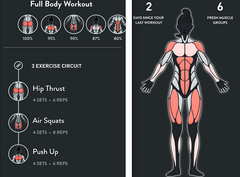A strong back starts with your motivation [31.10.22]
A Tuebingen-led research team shows in a recent paper how a physical intervention, i.e., a app-based home exercise program led to a significant and clinically relevant reduction in pain intensity throughout the 12-week program.
Original Study
Hannes Weise1,2,3; Benedikt Zenner 4; Bettina Schmiedchen 5; Leo Benning 5; Michael Bulitta 6; Daniel Schmitz 6; Kuno Weise 1,2,7. (2022) The Effect of an App-Based Home Exercise Program onSelf-reported Pain Intensity in Unspecific and Degenerative Back Pain: Pragmatic Open-label Randomized Controlled Trial. J Med Internet Res. 2022 Oct 28;24(10):e41899.
- Institute for Occupational Medicine, Social Medicine and Health Services Research, University Hospital Tübingen, Eberhard-Karls-University Tübingen,Tübingen, Germany
- Medical Assessment Institute Tübingen, Tübingen, Germany
- Faculty of Medicine, University Hospital Tübingen, Eberhard-Karls-University Tübingen, Tübingen, Germany
- Institute of Health Care and Public Management, Hohenheim University, Stuttgart, Germany
- Vivira Health Lab, Berlin, Germany
- CRM Biometrics, Rheinbach, Germany
- Faculty of Medicine, BG-Hospital Trauma Center Tübingen, Eberhard-Karls-University Tübingen, Tübingen, Germany
Abstract
Background: The recommended first-line treatment for unspecific and degenerative back pain consists of movement exercises and patient education.
Objective: Using a pragmatic, randomized controlled trial, we evaluated the effectiveness of a digital home exercise program on self-reported pain intensity compared with the standard of care for physiotherapy.
Methods: Participant recruitment was based on newspaper advertisements and a consecutive on-site assessment for eligibility and enrollment. Participants with unspecific and degenerative back pain aged ≥18 years were randomly assigned in a 1:1 ratio to receive a 12-week stand-alone digital home exercise program or physiotherapy. The digital home exercise program included 4 exercises daily, while physiotherapy included 6 to 12 sessions, depending on the severity of symptoms. The primary outcome was pain, which was assessed using a verbal numerical rating scale. The clinical relevance of pain reduction was assessed using the following thresholds: improvement of at least 1.4 points on the verbal numerical rating scale and a pain reduction of at least 30%.
Results: During the study period, 108 participants were assigned to the intervention group and 105 participants to the control group. The mean difference in pain scores between the 2 groups at 12 weeks was -2.44 (95% CI -2.92 to -1.95; P<.01) in favor of the intervention group. The group receiving the digital therapeutic achieved a clinically relevant reduction in pain over the course of the study (baseline vs 12 weeks), with a mean change of -3.35 (SD 2.05) score points or -53.1% (SD 29.5). By contrast, this change did not reach clinical relevance in the control group (mean -0.91, SD 1.5; -14.6%, SD 25.3). Retention rates of 89.9% in the intervention group and 97.3% in the control group were maintained throughout the study.
Conclusions: The use of the app-based home exercise program led to a significant and clinically relevant reduction in pain intensity throughout the 12-week duration of the program. The intervention studied showed superior improvement in self-reported pain intensity when compared with the standard of care. Given the great demand for standard physiotherapy for unspecific and degenerative back pain, digital therapeutics are evolving into a suitable therapeutic option that can overcome the limitations of access and availability of conventional modes of health care delivery into this spectrum of indications. However, further independent evaluations are required to support the growing body of evidence on the effectiveness of digital therapeutics in real-world care settings.
Trial registration: German Clinical Trials Register DRKS00022781; tinyurl.com/hpdraa89.
Keywords: back pain; digital health; digital therapeutic; exercise therapy; mHealth; mobile health; mobile phone; musculoskeletal health; primary care.
Contributer from Hohenheim: Benedikt Zenner
 | Chair of Economics and Management of Social Services Phone: +49 711/459-23420 E-Mail: Benedikt.Zenner@uni-hohenheim.de Research of the Department |
|---|


